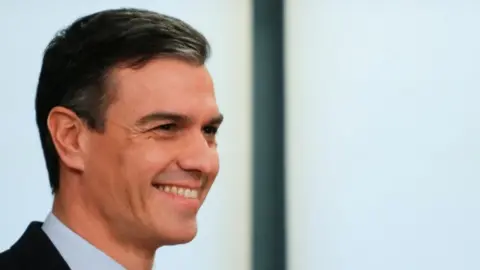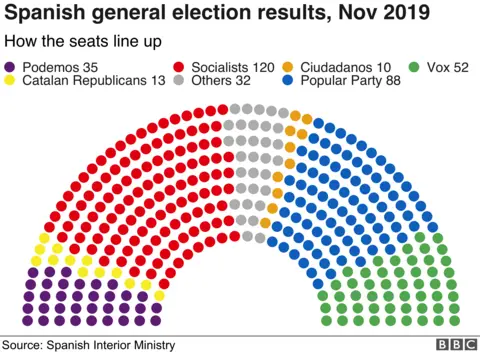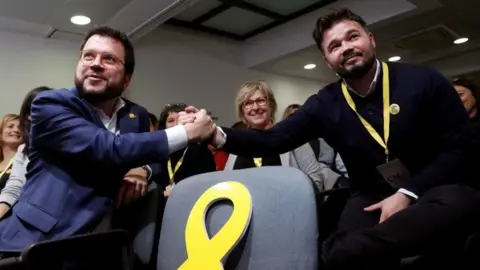Spain coalition talks: Sanchez wins Catalan support to form government
 Reuters
ReutersSpain's interim Prime Minister Pedro Sánchez has been backed by Catalonia's largest separatist party to form a coalition government.
Esquerra Republicana de Catalunya (ERC) MPs are to abstain in a confidence vote next week, paving the way for a new term for Mr Sánchez.
The ERC said a Mr Sanchez-led government would hold talks on Catalonia's future.
Spain has been racked by political uncertainty for almost a year.
The country saw two inconclusive elections last year coupled with Catalonia's on-going drive for independence.
In November's election, Mr Sánchez's Socialist Party (PSOE) won the most seats, but fell short of the 176 required for a majority in parliament.
The Socialist Party has struck a deal to form a coalition government with far-left party Podemos. Yet the Socialist Party and Podemos still don't have a majority in parliament, meaning they need the support of other smaller parties, including the ERC.


With the ERC's 13 seats and a possible combination of support from other leftist or Basque parties, Prime Minister Sánchez could continue in office at the head of a coalition.
That outcome appears more likely after the ERC's national committee said on Thursday its MPs would abstain in confidence votes expected over the weekend and next Tuesday.
Mr Sánchez appears set to lose the first vote, in which he requires an absolute majority. But in the second vote he just needs more votes in favour than against and should now have them if the ERC abstains.
What does the deal mean for Catalonia?
The Socialist Party has agreed to set up negotiations between Spain's central government and the Catalan government to "unblock the political conflict over the future of Catalonia and establish the basis for its resolution".
A citizens' vote based on the conclusions of the talks will be held in Catalonia, Reuters news agency reports.
"It is a difficult, complex path. We think it is worth taking," Pere Aragonès, Catalonia's vice president, told reporters.
The future of Catalonia, a semi-autonomous region in north-east Spain, was a major issue in last November's election.
The election came less than a month after Spain's Supreme Court handed out lengthy jail sentences to nine Catalan independence leaders, over their role in organising an outlawed referendum in 2017.
The move triggered protests and violence on the streets of Barcelona and other cities in Catalonia.
The Catalan crisis dominated the election campaign, with parties on the right - Vox, the PP and the centre-right Ciudadanos - taking a hard-line anti-separatist stance.
Who are the ERC?
The Republican Left of Catalonia (as their name translates from Catalan) is the region's oldest separatist party.
Its president, Oriol Junqueras, is one of the separatist leaders jailed by Spain in October for sedition, over their part in the illegal independence referendum of 2017.
 EPA
EPAIn Catalonia, the ERC won three seats more than its centre-right separatist rival, Junts per Catalunya (Together for Catalonia), the party of former Catalan President Carles Puigdemont.
The ERC voted to support a new Spanish coalition government in return for talks on independence in November last year.
